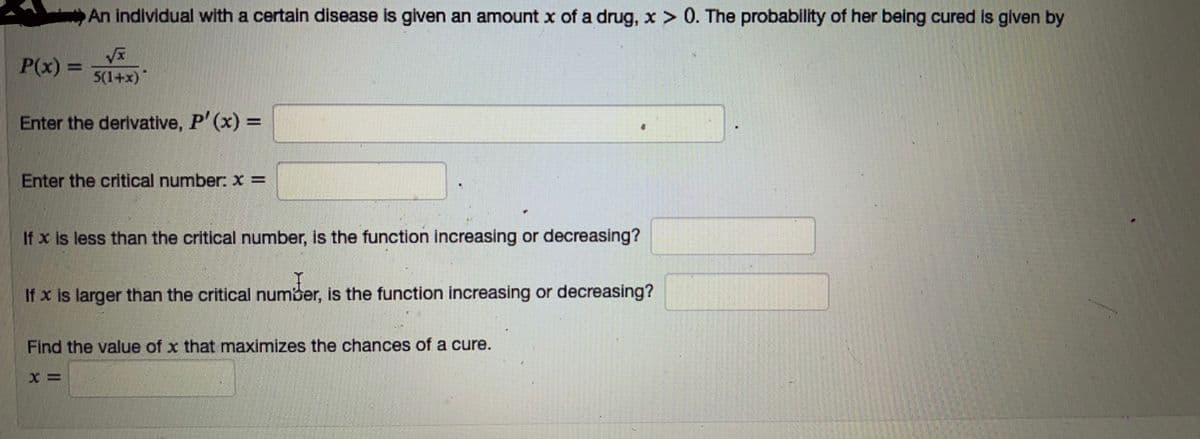An individual with a certain disease is given an amount x of a drug, x > 0. The probability of her being cured is given by √√x 5(1+x) P(x) = Enter the derivative, P'(x) = Enter the critical number: x = If x is less than the critical number, is the function increasing or decreasing? If x is larger than the critical number, is the function increasing or decreasing? Find the value of x that maximizes the chances of a cure. x =
An individual with a certain disease is given an amount x of a drug, x > 0. The probability of her being cured is given by √√x 5(1+x) P(x) = Enter the derivative, P'(x) = Enter the critical number: x = If x is less than the critical number, is the function increasing or decreasing? If x is larger than the critical number, is the function increasing or decreasing? Find the value of x that maximizes the chances of a cure. x =
Functions and Change: A Modeling Approach to College Algebra (MindTap Course List)
6th Edition
ISBN:9781337111348
Author:Bruce Crauder, Benny Evans, Alan Noell
Publisher:Bruce Crauder, Benny Evans, Alan Noell
Chapter2: Graphical And Tabular Analysis
Section2.1: Tables And Trends
Problem 1TU: If a coffee filter is dropped, its velocity after t seconds is given by v(t)=4(10.0003t) feet per...
Related questions
Question

Transcribed Image Text:An individual with a certain disease is given an amount x of a drug, x > 0. The probability of her being cured is given by
√x
5(1+x)
P(x) =
Enter the derivative, P'(x) =
Enter the critical number: x =
If x is less than the critical number, is the function increasing or decreasing?
If x is larger than the critical number, is the function increasing or decreasing?
number.
Find the value of x that maximizes the chances of a cure.
X=
Expert Solution
This question has been solved!
Explore an expertly crafted, step-by-step solution for a thorough understanding of key concepts.
This is a popular solution!
Trending now
This is a popular solution!
Step by step
Solved in 2 steps with 2 images

Recommended textbooks for you

Functions and Change: A Modeling Approach to Coll…
Algebra
ISBN:
9781337111348
Author:
Bruce Crauder, Benny Evans, Alan Noell
Publisher:
Cengage Learning

Algebra & Trigonometry with Analytic Geometry
Algebra
ISBN:
9781133382119
Author:
Swokowski
Publisher:
Cengage

Trigonometry (MindTap Course List)
Trigonometry
ISBN:
9781337278461
Author:
Ron Larson
Publisher:
Cengage Learning

Functions and Change: A Modeling Approach to Coll…
Algebra
ISBN:
9781337111348
Author:
Bruce Crauder, Benny Evans, Alan Noell
Publisher:
Cengage Learning

Algebra & Trigonometry with Analytic Geometry
Algebra
ISBN:
9781133382119
Author:
Swokowski
Publisher:
Cengage

Trigonometry (MindTap Course List)
Trigonometry
ISBN:
9781337278461
Author:
Ron Larson
Publisher:
Cengage Learning